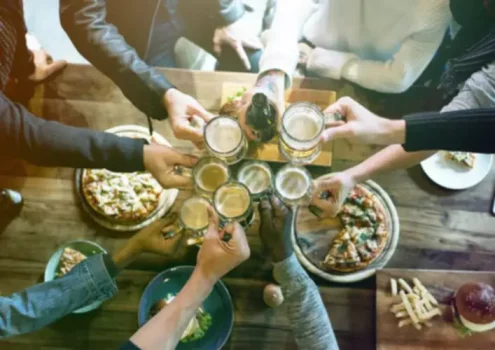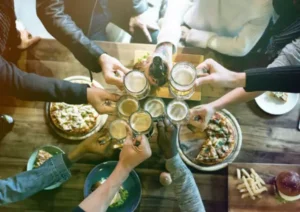
On the other hand, their mask could start to slip, giving you a glimpse of the vulnerable inner self hiding behind the narcissist’s disguise. When a narcissist gets drunk, the situation can quickly deteriorate as their grandiose behavior becomes increasingly exaggerated. If you frequent a lot of bars, you’ve probably noticed that alcohol brings out the narcissist in everyone and tends to amplify a true narcissist’s most unpleasant characteristics.

Social and Public Health Perspectives on Alcoholic Narcissism
A psychiatrist may carry out a standard psychiatric interview, which healthcare professionals use to diagnose personality disorders. Healthcare professionals may also use the Narcissistic Personality Inventory to diagnose narcissism. A 2019 study looked at the link between narcissism and alcohol consumption in a questionnaire of 345 college students.
- Although alcohol misuse and AUD can cause someone to display narcissist-like behavior, this behavior might change when they’re sober or in recovery.
- One of the most significant impacts of being in a relationship with an alcoholic narcissist is the constant need for attention.
- Suggest that the alcoholic narcissist seek professional help to address both their addiction and narcissistic traits.
- People with this type are much more sensitive, and narcissistic behavior helps protect them from feelings of being inadequate.
- As far as the narcissist is concerned, they tell the truth 99% of the time, but that doesn’t necessarily mean that truth aligns with yours.
Signs Of Alcoholism
- People who are at the highest end of the spectrum are the people who are classified as NPD.
- People with narcissistic personality disorder may be generally unhappy and disappointed when they’re not given the special favors or admiration that they believe they deserve.
- With any mental health condition, the outlook is almost invariably better if you are treated than not treated.
- To treat dual diagnosis, people will receive treatment options for both NPD and AUD.
- There are no medications to treat NPD, but if you also experience depression or another mental health condition, a doctor may prescribe medications to treat the other condition.
Narcissistic Personality Disorder (NPD) is a disorder in which someone acts selfishly and thinks highly of themselves. In reality, these behaviors are often a mask for an individual’s fragile self-esteem and self-image. Addiction Resource aims to provide only the most current, accurate information in regards to addiction and addiction treatment, which means we only reference the most credible sources available. Many of the symptoms of NPD are thought to be the result of a sensitive or vulnerable ego. While they may not show it outwardly, criticism is especially unbearable for a narcissist. They may dwell on it, or be haunted by it, and end up enraged or retaliating.
Grandiose Narcissism and Alcohol Outcomes
When facing abuse, many people eventually adjust their self-identity to accommodate an abusive partner. A partner using narcissistic manipulation might respond with extreme anger. They may respond with accusations of their own and redirect blame, saying things that are intended to hurt and belittle you.
Another reason narcissists are likely to become alcoholics narcissism and alcoholism is their desire to fit in or stand out in social situations. In this article, I want to explore the relationship between narcissists and alcohol, examining why they drink and how alcohol affects their behavior. Similarly, people with dual diagnosis can manage their symptoms with appropriate treatment. With AUD, a person’s behavior may change depending on whether they are sober or not. An individual with NPD will display a consistent pattern of narcissistic behavior. If you think you have NPD, try to make an appointment with a mental health professional.


Treating each condition independently can sometimes lead people to “choose one over the other,” especially if care is not coordinated. One example is being referred to Alcoholics Anonymous (AA) on the presumption of AUD. In such cases, a person might start to question the diagnosis and abandon treatment altogether even if another condition, such as NPD, actually exists. Self-centered and unable to escape his own self-destruction, he is probably spiraling out of control right now.
- Though it is against our prediction, it isn’t completely surprising that vulnerable narcissists expect to experience problems.
- By working on both of these issues, the person in recovery has a chance to regain control over their lives and find healthier ways to navigate their relationships and emotions.
- You’re more likely to doubt your perceptions of the abuse when you can’t talk with anyone about it.
- Promoting awareness, support, and education can ultimately lead to a healthier and more informed population.
- Addiction Resource aims to provide only the most current, accurate information in regards to addiction and addiction treatment, which means we only reference the most credible sources available.
People can misuse alcohol without having AUD or being addicted to alcohol. They might infrequently have bouts of excessive drinking, for example, but find that it doesn’t affect their life and that it’s easy to cut back on alcohol (or to stop drinking entirely). However, NPD includes other traits, such as needing constant praise and special treatment, reacting negatively to criticism, and manipulating others. People with NPD might be unwilling or unable to recognize others’ feelings and needs.
Am I a Binge Drinker or an Alcoholic?
Individuals with a NPD feel they can only be understood by special people. They take advantage of others, especially to accomplish their own goals. These individuals have a lack of concern for the well-being of others or how others may be affected by their actions. These individuals will debate, argue, distract, or back you into a corner, due to the way alcohol affects them.
